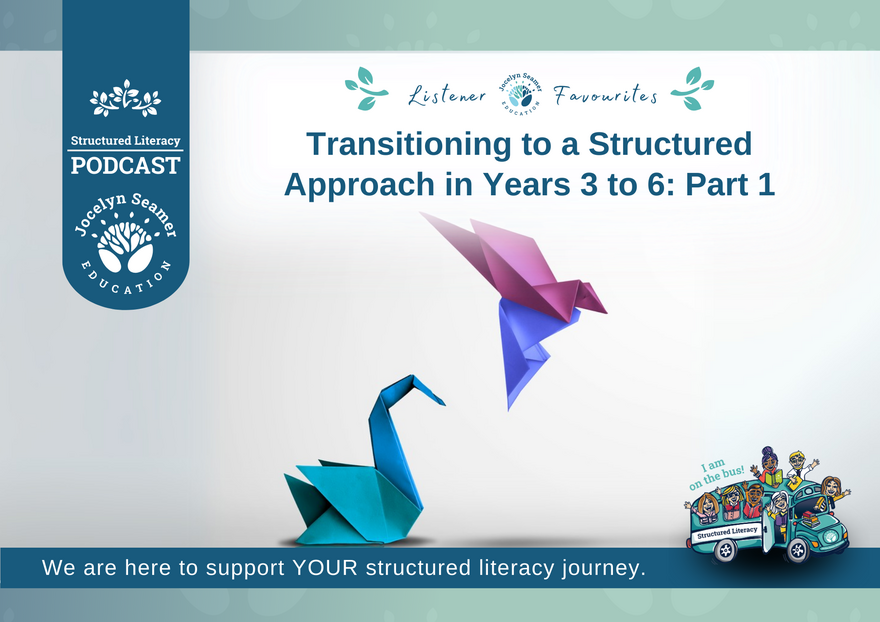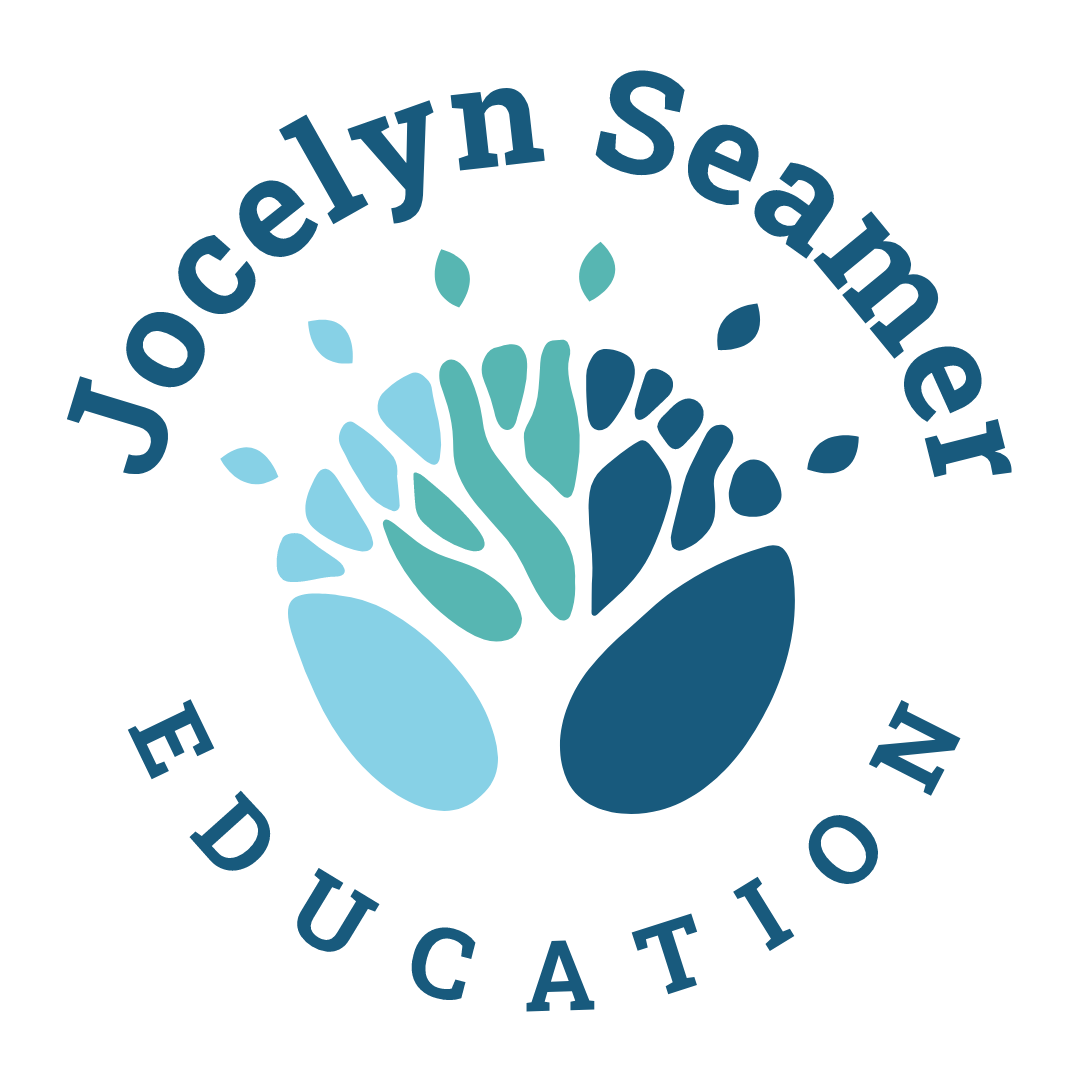S3 Ep24 - Shifts to move to a structured approach in Years 3 to 6 Part 1

Hi there, welcome to the Structured Literacy Podcast. I'm Jocelyn, and it's wonderful to welcome you to this latest episode recorded here in Pataway, Burnie.
Right now in Tasmania, it is almost mid-winter, the Ugg Boots are out, the fire is lit and we are snuggling up against the cold. That doesn't mean that the hard work of supporting teams in their structured literacy journey stops, though.
In the last episode of the podcast, I shared a suggestion of the order in which you could implement new literacy practices across the literacy block in years three to six. This episode, which is part one of a two-part series, focuses on the shifts we need to make as we build robust, explicit routines and practices across our classrooms.
In this episode, we'll begin to step through the literacy block and explore changes in how we approach spelling and word level knowledge and how we choose texts for students to read. In the next episode, we'll get stuck into reading comprehension and writing.
1:41
Let's start with daily low variance word level instruction.
This work is often focused on spelling, as is appropriate. Teaching students to spell has so many positive impacts on reading that it's sensible to give time and energy to this area of instruction. So many teachers I speak with have some kind of regular spelling work happening, but it's focused on phonics right across years three to six. The shift here is to focus on phonics for only as long as it takes for students to have a handle on the basics of the alphabetic principle and then move on to other things.
Students need to experience robust learning across phonics, orthography and morphology.
Once students know how to read and spell with around 70 graphemes and have moved into word recognition, it's time to move instruction into the orthography and morphology space. And orthography is about spelling conventions, or I guess we used to call them spelling rules. Focusing only on phonics denies students access to the rest of the story of how English words work.
2:49
This brings me to the second shift in word level instruction. A shift to structured, explicit teaching brings with it a focus on building knowledge, not just doing in spelling.
Even now, so much instruction focuses on what students do rather than what they know and can apply. Approaches to this work that involve worksheet type activities, memorisation strategies with repeated writing of words, and any instruction that doesn't require students to actually think and interact with new learning, do not build knowledge for students.
So, instead of lessons where students are doing things, where they are completing activities on their own after a short introduction, or whether they are going through the motions of a lesson just because you're telling them to, it's important that we get students thinking about concepts, practicing them, applying them in context and interacting with each other.
Students shouldn't feel that they're just going through the motions of spelling.
They certainly shouldn't feel that learning is being done to them. We want them to know that learning is done with them because it's about them.
Finally, when it comes to learning in phonics, orthography and morphology, instruction should be explicit. Inquiry approaches, analytic approaches or other pedagogical approaches that leave the students to figure out the learning on their own leave so many students behind. If you would like to explore more about what makes spelling instruction really explicit, have a listen to Season 3, Episode 19 of the podcast.
4:25
The next shift that is needed to move to a more robust, explicit approach to instruction in 3-6 is about what students are reading.
Previous practice saw us conducting a levelled text assessment, such as a benchmark assessment, and then finding books that matched the student's reading level. The first issue here is that the levels didn't really mean anything. The second issue is that there isn't any research to support matching texts to the students.
What there is is evidence that, once students can lift words from the page, one of the important factors in continued reading growth is rich texts that are a little bit harder than they can manage on their own. That doesn't mean that we throw hard texts at them and let them go for it. It means that we ensure that rich, suitably complex texts are a part of the everyday life of the classroom.
5:17
And you may be thinking,
Well, what about students who struggle with reading? Don't they need simpler texts?
The answer to that is sort of. If students are still learning to decode, they need access to text, such as appropriate decodable text that help them learn to do that. But they also need access to age-appropriate rich texts. Our job is to help them access them.
So this shift in practice is about gorgeous texts that provide stretch. It's also in how we run a lesson to support students to read these texts. It's no news to you that rich texts belong in the three to six classroom. Upper primary teachers have been using rich texts, including novels, for forever and a day.
6:00
The difference between what we've done and what we can be doing is how lessons are run.
I'm going to let you in on a secret and I want you to keep it just between us. When I first started teaching in this way in about 2017, I called the work whole class guided reading. Yes, you heard me correctly. What I'm proposing is guided reading.
Before you start posting in Facebook groups about how Jocelyn Seamer supports guided reading, I'm not talking about small group rotations or levelled texts. I'm talking about working whole class to support students to engage with gorgeous, rich texts. Many listeners will be thinking that that's what's already been done, and that might be the case.
6:45
One of the key differences between a fully guided approach and the way that we might be doing it is the guidance bit.
Often in a novel study, we'll assign a section of text and read it, either with the teacher reading aloud, students taking turns to read or students reading independently. Then we give students questions to answer at the end of the lesson. In their book, Robust Comprehension Instruction with Questioning the Author, Beck, McKeown and Sandora suggest that questioning at the end of a reading leaves way too much to chance.
How do we know if the wheels fall off comprehension?
And if it does, how do we know when it's happened?
It's possible that students lose comprehension of the text in the first few sentences and we don't know.
7:31
A fully guided approach involves reading with students, stopping regularly, discussing what we've read and making sure that students are engaged all the way through.
Beck, McKeown and Sandora's book also has guidance for us about the kinds of questions we might ask. In fact, they recommend not making them questions at all, but rather that we pose queries.
The other bit of guidance about types of questions to ask comes from Reading Reconsidered by Lamov, Driggs and Woolway. In Reading Reconsidered, we are introduced to the idea of switching things up between questions that focus on larger elements of the text and then zooming in to specifics around vocabulary, syntax and language devices.
So many of the shifts in practice in the upper primary literacy block are not about the what but about the how, specifically, how intensive and explicit our instruction is.
This episode is the first part of a two-part series, so pop back next week for part two, where we dive into two more shifts in the Upper Primary Literacy block in reading comprehension and writing.
I'll see you next time. Bye.
References:
Beck, I.L., McKewon, M.G., and Sandora, C.A. (2020). Robust Comprehension Instruction with Questioning the Author. Guilford Publications.
Lemov, D., Driggs, C., and Woolway, E. (2016). Reading Reconsidered: A Practical Guide to Rigorous Literacy Instruction. Jossey-Bass.
Other Useful Episodes
S3 Ep19 - How To Make Sure That Your Spelling Instruction Is Explicit
Ready to join us for our latest FREE program? Click here


 Jocelyn Seamer Education
Jocelyn Seamer Education
0 comments
Leave a comment